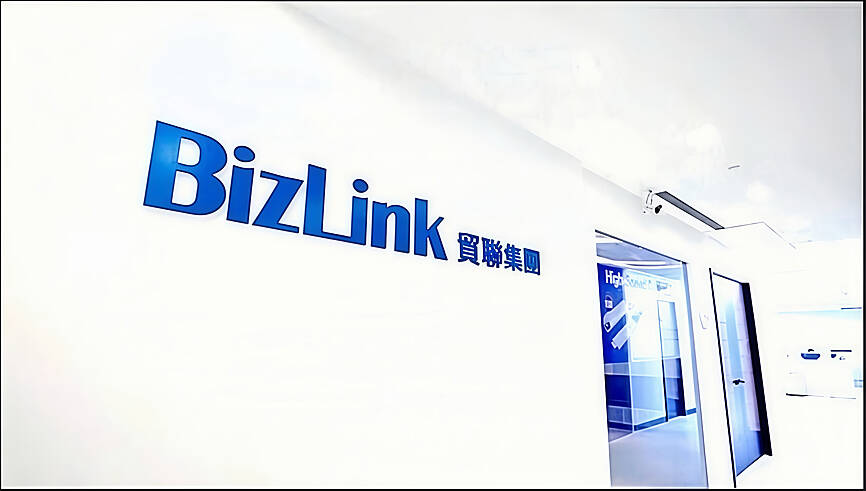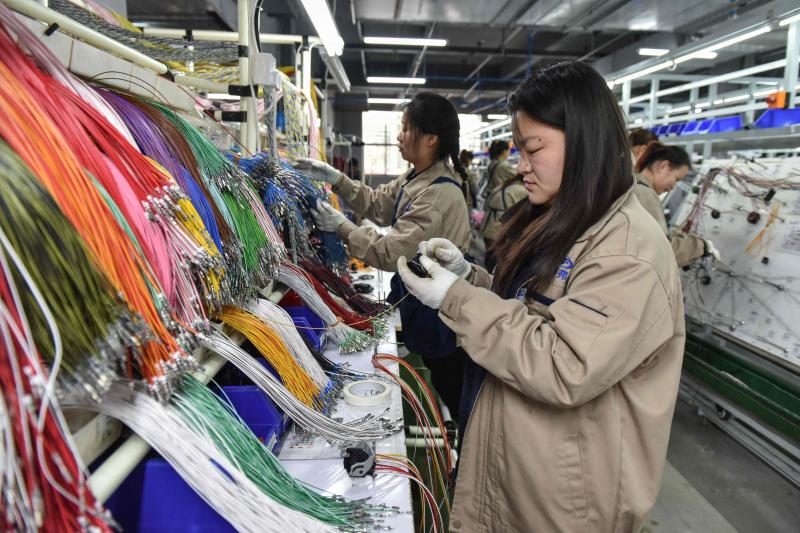Wire harness maker BizLink Holding Inc (貿聯控股) on Tuesday said it is to acquire a 100 percent stake in Alpha Elektrotechnik AG in Switzerland to offer high-voltage cable solutions.
The deal, valued at 24.3 million Swiss francs (US$27.49 million), would be financed through an all-cash transaction and is expected to be completed in the second quarter, the company said.
Alpha, a rolling stock unit spun off from rotary transfer machine maker Pfiffner Group, offers high-voltage cable solutions for high-speed trains, intercity trains, local trains and locomotives, BizLink said.

Photo courtesy of BizLink Holding Inc
In its latest fiscal year, Alpha recorded sales of 11.1 million Swiss francs, it said.
“We will leverage our collaborations with Alpha to realize synergies in technology and new application development, as well as in market access development,” BizLink chief financial officer Charles Tsai (蔡策申) said. “This deal is expected to be accretive from day one.”
“The attractiveness of the rolling stock interconnect market is underscored by its robust growth prospects, technological innovation and strategic consolidation, with only a few known and reliable solutions providers, including BizLink,” Tsai said. “We ... look forward to their contributions.”

Photo: AFP
BizLink supplies wiring harnesses and other interconnect solutions for global brands.
The Alpha deal comes after the company last year acquired Slovakian electrical equipment maker Easys s.r.o. for 51.5 million euros (US$56.04 million) to bolster its semiconductor equipment business and extend its reach in eastern Europe.
BizLink said its capital expenditures this year are expected to be higher than the US$80 million to US$100 million it spent in past years as the company prepares for growth.
Most of the money would be spent on equipment, especially for high-performance computing and semiconductor equipment, the company said.
It would also update information technology systems to accelerate its digital transformation efforts, the company added.
In addition, BizLink said it would continue to rationalize the company’s footprint in China’s Changzhou and Xiamen, as well as pursue strategic expansion elsewhere, including in Southeast Asia.
BizLink on Tuesday also released its financial results for the fourth quarter of last year and for the whole of the year.
During the October-to-December quarter, the company’s net profit was NT$1.56 billion (US$47.4 million), up 206 percent year-on-year and hitting the highest level for a single quarter, with earnings per share of NT$8.28. Revenue in the quarter rose 18 percent to NT$14.41 billion from a year earlier.
For the full year, the company reported total net profit of NT$4.4 billion, up 89.7 percent from the previous year, with earnings per share of NT$25.41, also the highest on record. Revenue rose 5.93 percent to NT$54.08 billion.
Last year, gross margin improved by 3.55 percentage points to 28.2 percent, the highest in eight years, while operating margin increased by 3.84 percentage points to 12.1 percent, a record high, company data showed.

TAKING STOCK: A Taiwanese cookware firm in Vietnam urged customers to assess inventory or place orders early so shipments can reach the US while tariffs are paused Taiwanese businesses in Vietnam are exploring alternatives after the White House imposed a 46 percent import duty on Vietnamese goods, following US President Donald Trump’s announcement of “reciprocal” tariffs on the US’ trading partners. Lo Shih-liang (羅世良), chairman of Brico Industry Co (裕茂工業), a Taiwanese company that manufactures cast iron cookware and stove components in Vietnam, said that more than 40 percent of his business was tied to the US market, describing the constant US policy shifts as an emotional roller coaster. “I work during the day and stay up all night watching the news. I’ve been following US news until 3am

Six years ago, LVMH’s billionaire CEO Bernard Arnault and US President Donald Trump cut the blue ribbon on a factory in rural Texas that would make designer handbags for Louis Vuitton, one of the world’s best-known luxury brands. However, since the high-profile opening, the factory has faced a host of problems limiting production, 11 former Louis Vuitton employees said. The site has consistently ranked among the worst-performing for Louis Vuitton globally, “significantly” underperforming other facilities, said three former Louis Vuitton workers and a senior industry source, who cited internal rankings shared with staff. The plant’s problems — which have not

TARIFF CONCERNS: The chipmaker cited global uncertainty from US tariffs and a weakening economic outlook, but said its Singapore expansion remains on track Vanguard International Semiconductor Corp (世界先進), a foundry service provider specializing in producing power management and display driver chips, yesterday withdrew its full-year revenue projection of moderate growth for this year, as escalating US tariff tensions raised uncertainty and concern about a potential economic recession. The Hsinchu-based chipmaker in February said revenues this year would grow mildly from last year based on improving supply chain inventory levels and market demand. At the time, it also anticipated gradual quarter revenue growth. However, the US’ sweeping tariff policy has upended the industry’s supply chains and weakened economic prospects for the world economy, it said. “Now

UNCERTAINTY: Innolux activated a stringent supply chain management mechanism, as it did during the COVID-19 pandemic, to ensure optimal inventory levels for customers Flat-panel display makers AUO Corp (友達) and Innolux Corp (群創) yesterday said that about 12 to 20 percent of their display business is at risk of potential US tariffs and that they would relocate production or shipment destinations to mitigate the levies’ effects. US tariffs would have a direct impact of US$200 million on AUO’s revenue, company chairman Paul Peng (彭雙浪) told reporters on the sidelines of the Touch Taiwan trade show in Taipei yesterday. That would make up about 12 percent of the company’s overall revenue. To cope with the tariff uncertainty, AUO plans to allocate its production to manufacturing facilities in